You might have heard that there’s a board game renaissance that’s currently exploding around the world. It originated in Germany, crawled its way across Europe, firmly displaced the more war-like competitive games in America (more on that in a minute), and has finally found itself on the shores of India. There are several contributing factors. These board games are good (nigh excellent). The internet is marvellous (bringing both knowledge and free online ways to play board games). And there was a pandemic. (Wow. It feels marvellous to use “was” in that sentence—more on that in a minute.)
But the good readers of this newsletter might have been inadvertently left behind. They may have missed the memo, forgotten to catch the bus, or mispronounced “renaissance” on the way to the fair. Wherefore board games? Whither may they be found?
Let’s address the wherefore. Board games are a way to bond. A pleasant endorphin release. And they make smart people into smarter people.
Board games? You may ask. Rolling a dice, and moving a hat to Mayfair so that Aunty Monica takes all my money? How does that make you smart? Well that particular board game doesn’t. More on that in a minute.
What makes a good board game then? Well one, we want it to lean away from luck and towards smarts. Two, no one should want to give up, or be eliminated part way through the game, which brings us to three: you should either not be able to tell who is winning, or create the potential for dramatic comebacks. So let us all agree then, Monopoly sucks. Monopoly and other dice-based jettisonable divertissements are what the gaming industry likes to call Ameri-trash.
That brings us to Eurogames. This is the opposite of Ameri-trash. You see, it’s not actually a board game revolution. It’s a Eurogame revolution. What is a Eurogame? That’s far too complicated a question. Let me see, oh yes, they are board games that make smart people into smarter people.
So, without further ado, here are 5 board (Euro) games that you should try while we still have some pandemic left to try them in.
1. Mint Works
“But Ronaan,” you tell me, “board games are huge, and pricey, and take forever.” Well, our first game will tolerate none of your excuses, because it’s about Rs 1,000, takes about 20 minutes to play, and fits in a mint tin.
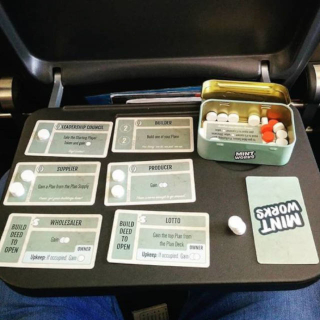
Launched as part of a competition (to fit a board game into a mint tin), Mint Works is a fab introduction to minimalist Eurogames. On your turn you take a mint shaped token and place it on one of 10 cards. Some cards give you more mints, some cards let you build factories. Before you know it, you’re minting mints and on your way to building your own mini-mint mega-empire.
It is seductively simple to learn, and yet there is so much outsmarting that comes out of the tin. As an added advantage, it’s small enough that one can whip it out in an airplane. Ask your co-passenger if they want to play. And if they decline, never fear, continue on in solo mode and outsmart the tin itself.
2. The Crew
Easing you up the complexity ladder, the fairly nondescript The Crew is next. It’s a trick-taking card game at its heart, so if you’ve ever played 21, or Bridge, or even Hearts on an early PC, you know what it’s about. But wait, there’s a twisty twist.
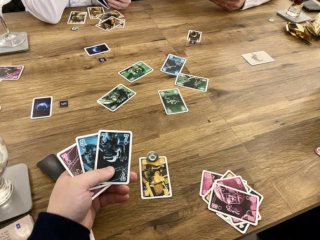
So, you’re in space. And you have to complete certain missions, as spelt out in the log book. Players have to play collaboratively to do so. These tasks may specify an order in which the tricks should be taken, or specify that one crew member is not allowed to take any tricks. But because it’s in space, you can’t talk. There are a few ways, mostly non-verbal, that you are allowed to communicate with each other, but they’re a one-time only use, and very limited in what they allow to be communicated. The Crew has you working together mutely, to puzzle out how on Jupiter they’re going to get a high card to a person with a low hand, or how do we make sure the “sick” crew member wins no tricks, or how is one person supposed to win all the pink cards, when the highest pink card is with the person to their left?
Thus begins a head scratching quandary that is as much strategy as human psychology. “What do I do next?” is often preceded by “What do they have in their hand to make them play that?”
I recommend this as a game to play with your family, especially across generations. Collaborative trick-taking is a concept that will blow the mind of the seasoned card player, and it’s a wonder that no one has hitherto devised a game with such a mechanic.
3. Pandemic (Legacy)
“But Ronaan,” you may ask, “so far none of your board games actually have boards. Where are the big guns?”
Yes, of course, you’re right, gentle reader. Allow me to bring out the biggest gun there is.
You may have come across or played the base game Pandemic, which came out 14 years ago (more than a full 10 years before the actual pandemic). You play co-operatively as members of the CDC trying to balance out the short-term goal of containing the spread of four diseases, with the long-term goal of curing the diseases. It’s a game where you might hear statements like “I think it’s okay to allow an outbreak in Chennai, if it means we can cure the black plague.”
The game is tense, requires collective planning, and often has a nail-biting finish. And throughout all of this, you can find your entire team beaten, tricked and bamboozled by an inanimate deck of cards, and some of the best mechanics in board game design.
Two mechanics in particular shine. First, diseases if left unchecked can spiral out of control through a chain reaction that can quickly threaten to get totally out of hand. And second, every so often a trigger makes you shuffle the discard pile and put it back on top of the deck. Then you have to draw from the deck, and choose what cities to infect. This means you know exactly which cities are likely to get reinfected. And if one of those cities is the starting point of a clear domino effect, it basically means you’re picking up cards on your turn knowing that planetary doom is just another draw away (but you don’t know exactly when). Scramble then, to retrace your steps trying fruitlessly to keep ahead of the disease, wipe the sweat from your brow, and watch with dread as the next player tentatively reaches towards the card deck.
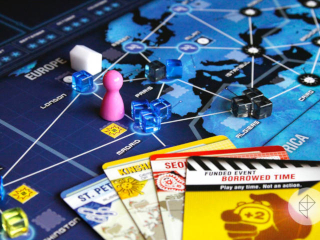
But if this wasn’t good enough, there’s a better version out there. Take my advice and buy Pandemic Legacy instead of the baseline Pandemic. Because you can play the base game of Pandemic as many times as you want, and when you’re done, whip out a deck of cards that trigger events that change absolutely everything that came before it.
Pandemic Legacy simply hasn’t understood that it’s a board game and not a summer blockbuster. Cities fall, heroic sacrifices are made, and you’re left balancing out short-term (how do we contain these four diseases?), long-term (how do we cure the diseases?), and the unknowable future (how do we stop the end of the world as we know it?). Just like in the real pandemic, you’re making your decisions based on incomplete information and constantly shifting sands. You have to plan, you know that what’s about to come is unplannable, but it’s better than having no plan at all. It’s little wonder that Pandemic Legacy is almost always voted either number 1 or number 2 in any board game list constructed.
4. Dune Imperium
All this collaboration is well and good, but you want to thrash someone else for a change. Never fear, the next selection has you luring people into the desert and then slitting their throat, but running their blood through a still suit to collect the moisture. One of the earliest famed Eurogames was the board game Dune, which came out in the 1980s and was based on the book. It was an excellent board game, but had a ridonkulously exhausting play time of between 1 and 6 hours.
So, there was a lot of hype and speculation when a new game, Dune Imperium, tying in with the next film, saw the light of day. The game has a few mechanisms built in, but is overall about building your deck, placing your worker (agent) and blindsiding your opponent. After just a few rounds, everyone knows what they’re doing. What they’re doing is committing resources into battle for a reward of some sort. It could be Solari (money), the ever essential and rare commodity water, or the mystical spice-drug of Arrakis. If you don’t know what I’m talking about, fret not, it’s just going to get more confusing from here on in.
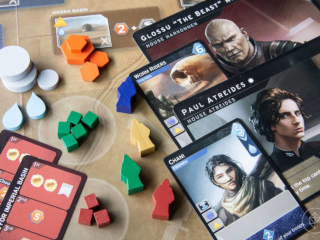
While the book has you watching the wheels within wheels play out, here you find yourself plotting out the many wheels within wheels within wheels. And depending on which playable leader you choose to start out with, you could have the foresight of Paul Atreides (you can look at one card in advance), or you could play the Harkonnen Beast and bring a sparkling brutality to the fights.
The game is interesting in that it gives you the “option” of dedicating your resources to enter combat, or choose to wait it out. You might think, “I’m not going to waste precious fighters to gain some petty prize”. However, you’ll quickly learn if your rivals are being ambitious and aggressive, you cannot afford not to be.
There are several obfuscated paths to victory, and umpteen permutations with which to start play. Depending on what cards you buy with your resources, and what your opponents are doing, the game urges shifting tactics and opportunistic duplicity. Thus, repeated plays of the game have an ever-evolving learning curve, as you’re constantly devising and re-devising strategy. It celebrates you playing such cruel fast ones like making a resource artificially scarce, and then using the “voice card”, to make sure that no person can go to the place where the resource is available.
Once again, if you don’t find people to play with you there’s a clever solo mode, and an even cleverer support app that does the solo mode for you. I think it’s so that you feel better about being beaten by an electronic device rather than a deck of cards.
5. Kanban EV
What’s that you’re saying? Bring on the hard games? What is the zenith to max out the requisite ratiocinative prowess? Well, here you go, but this game comes with a couple of warning labels. Do not try this unless you’ve played a bunch of other board games first.
Celebrated designer Vital Lacerda exclusively designs beautiful brain burning games with many convoluted ways to gain victory points (the person with the most victory points at the end, wins). The games are usually 3-4 hours long with a bonus 30-40 minutes tagged on at the beginning, because that’s how long it takes to teach the game. Don’t say I didn’t warn you.
But the outcome is juicy, juicy planning and strategy. In Kanban EV, you simulate office work. You’re a dedicated shopfloor worker in an electric vehicle factory. You have to choose which department to use your shifts at, which may have you picking up car designs, collecting parts, testing a car or actually pushing a car down a conveyor belt. Watch out though, the car you push might help another player more than it helps you.
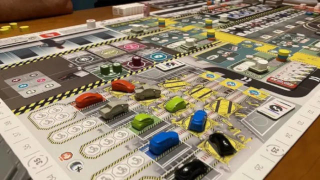
There is of course a boss called Sandra. She charges down from department to department reviewing all the players. Depending on which version of her you’re playing, she may gently encourage you to upskill yourself with rewards (Nice Sandra), or harshly sends you backwards on the victory point track if you’re the least skilled person in that department (Mean Sandra). Thus it is that you’re scrambling to be better qualified than the next person, while simultaneously trying to get work done.
Of course, Sandra has set some objectives, and has littered the board with speech tokens. Complete an objective and pick up a speech token. At the end of the week, you can spend a speech token boasting about your accomplishment, gaining you victory points. But you better be quick, because Sandra has little patience, and the next person who speaks on the same topic gets less points, and the last person, because Sandra has grown bored, gets no points at all.
And I’ve just gone into one sliver of a section of this slavish celebration of office politics. The game has several other long-term decisions you have to make. Should you produce cheap hatchbacks or expensive sports cars? Which part should you upgrade? And just like in real business, everyone is pretending to have some long-term game plan (and you should), but no one has a bloody clue.
Putting the pieces back in the box
Honestly speaking, if you make it through the first three (and you should), there were lots of choices for the last two slots. There are so many great games out there that I haven’t played. And Kanban EV is tough, but certainly not the toughest game out there. I have ensured, however, that the games on the list have immense replayability and oodles of fun. But you should definitely research a game before shelling out ten grand for one. I would advise that you check out your local board game cafe, pay Rs 200-400 to play there for a day, and try out games before you buy.
But you most certainly should play modern board games. They’re leaps and bounds more moving and complex than anything that existed in our youth, and you’ll be doing yourself a disservice by not diving in. Take a break from Netflix this weekend. Conquer a country with a plastic mini instead.
Here are a few links to help you on your way.
- Best place to look up reviews of board games: https://boardgamegeek.com
- Best place to play online board games for free: https://boardgamearena.com
- Best place to buy board games (significantly duty freer): https://www.boardgamesindia.com
- Best place to try out board games in person (Mumbai): https://www.chaiandgames.com/about_us.php
Any stellar board games we missed? Rave about them in the comments below.


